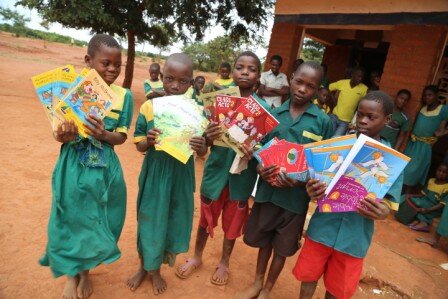
In Malawian schools more than two things remain undisputable during an inspection tour. It is either school blocks are not enough or libraries have no text books for learners to practice reading so they get the meat for English debates.
While other schools might have water and sanitation facilities courtesy of World Vision, they lack adequate teachers, a move deemed retrogressive to the upbringing of children who toil to have good education and achieve their goals.
Chisepo Primary School in Dowa, Malawi’s Central Region District is no exception to all these challenges. The most critical challenge the learners have faced is that of textbooks. Suffice to say that there are two school blocks.

The school has an enrolment of 8 896 learners (456 girls and 440 boys) and has 10 teachers and two school blocks.
“Life in school has not been easy due to lack of books. Motivating factors were amiss as there were no English competitions like debates and reading sessions,” says Caroline Kayimira, Standard Seven learner at Chisepo Primary School.
Visits to Chisepo in Village Head (VH) Chisepo, Traditional Authority (T/A) Kayembe show that the area has reading clubs, yet books have not been enough.
The lack of books meant to enhance the reading culture in learners contributed to increased school dropout rates and poor enrolment in recent years because most of them did not like the aspect of jostling around books.
The challenge was enormous. This posed a threat to lessons taught in English as there was minimal practical for learners to demonstrate their reading culture.
“We jostled over books during debates and reading club sessions. Only the lucky ones would get one and read stories to improve the reading fluency aspect,” enthuses Yankho Chibwe, Standard Eight learner.
This means that the likes of Caroline (13) and Yankho (14) and other learners have had tough times to enjoy English lessons or advance reading skills. They did not know a day will come soon to have thousands of English text books to improve their skills in reading and debate sessions.
They also did not know that English books have nice educative stories. Little did they know that in secondary school, it is a must to take English literature.
Today, Caroline and Yankho like other learners in 11 schools that have received a donation of books from World Vision Australia through Gifts in Kind (GIK).
Two Supporters of World Vision Australia like Peterson and Cengage publishers published the books. Each of the learners can now afford his or her own textbook following the timely donation in the area.
“We communicate in English with teachers and our parents. Initially, through debates and reading clubs, we are obliged to speak English. Previously, we could not because we had Chichewa books,” says Yankho.
Yankho comes from a family of four children and his parents are farmers. He wants to go to secondary and pursue a degree in mechanical engineering.
His counterpart, Caroline, who wants to be nurse thinks: “We could neither draw illustrations nor read English books before the assistance. We can read and write.”
Chairperson of the GIK committee and one of the Parent Teacher Association members Arnold Mkwezalamba hailed Pearson and Cengage for the textbooks.
The books have since been distributed to 11 schools in Chisepo Area Programme (AP) of World Vision Malawi through the GIK committee. Some of the schools that are benefiting include Chamitu, Solomon, Mwanza and Chitakazi.
Besides books, GIK also provides goods such as drugs, clothes, maize flour and shoes to the less privileged in Chisepo.
“I subscribe to what learners have said that most schools did not have books to boost reading culture. Malawi has a challenge of reading because of lack of books, this is why the books are recipe for improved results,” explains Mkwezalamba.
Head teacher of Chisepo Primary Gideon Kalinde alludes that with the availability of books, learners have formed quiz, debates and reading culture competitions.
“As teachers, we also get some lessons from such textbooks. We use some of the stories learnt in such books for quiz and storytelling competitions. We hail World Vision for the donations,” states Kalinde.
For Kalinde such competitions contribute to a positive pass rate and as such they are selected to conventional secondary schools.
“There is impact with the donations. For example, last year five learners were selected to Chamitu Community Day Secondary School. We want more learners to get selected to government boarding schools,” explains Mkwezalamba.
The donation, which is being described as timely seeks to improve the reading fluency in learners, who have been deprived of such an opportunity for long. From interviews, it was also evident that such books will motivate pupils to read more, reduce absenteeism as learners will have something to do after school.















why not here at mj?
Thus my job